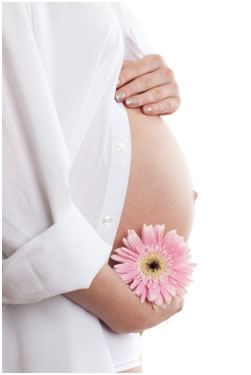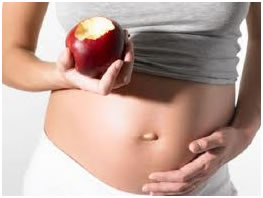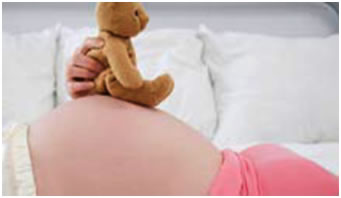Oral Health Care during Pregnancy

Pregnancy is a unique time in a woman's life and is characterized by complex physiological changes.
The perinatal period is defined as the period around the time of birth, beginning with the completion of the 20-28th week of gestation and ending 1-4 weeks after birth. Perinatal oral health plays a crucial role in the overall health and well-being of pregnant women. It is also essential for the health and well-being of their newborn children. Many women do not seek dental care during their pregnancy, and those that do often confront unwillingness of dentists to provide care. Many expectant mothers are unaware of the implications of poor oral health for themselves, their pregnancy, and/or their unborn child. Research continues to show links between periodontal disease and adverse outcomes in pregnancy including preterm deliveries, low birth weight babies, and preeclampsia. Furthermore, mothers with poor oral health and high levels of cariogenic oral bacteria are at greater risk for infecting their children with the bacteria and increasing their children’s caries risk at an early age. Dental caries in infants is a disease that generally is preventable. Determining those mothers at highest risk for transferring cariogenic bacteria to their children improves opportunities for preventive intervention. The primary goal of perinatal oral health care, with regard to caries transmission, is to lower the numbers of cariogenic bacteria in an expectant mother’s mouth so that mutans streptococci (MS) colonization of the infant can be delayed as long as possible.Timely delivery of educational information and preventive therapies to these parents can reduce the incidence of early childhood caries (ECC), prevent the need for dental rehabilitation, and improve the oral health of their children.
Recommendations:
Recommendations for perinatal oral health include the following:
Oral health education: The perinatal period is an opportune time to educate and perform dental treatment on expectant mothers. Early intervention and counseling during the perinatal period from all health care providers (eg, physicians, dentists, nurses) are essential to ensure good oral health for the mother and infant.
Oral hygiene: Toothbrushing with fluoridated toothpaste and flossing by the mother are important to help dislodge food and reduce bacterial plaque levels. Systematic literature reviews suggest an association between periodontal disease and an increased risk of adverse pregnancy outcomes, including preterm deliveries, low birth weight babies, and preeclapsia. Periodontal infections, which can be a reservoir for inflammatory mediators, can pose a threat to the placenta and fetus which can increase the likelihood of preterm delivery. Mothers with severe periodontitis have high levels of prostaglandin in their gingival crevicular fluid and blood. In turn, these increased levels of prostaglandins may be associated with uterine contractions leading to preterm deliveries. Regardless of the potential for improved oral health to improve pregnancy outcomes, the data on the relationship between maternal and child experience with dental caries is well established. Therefore, comprehensive dental services for pregnant women should be available so that, not only their own oral and general health is safe guarded, but also so that their children’s caries risk is reduced.
The effects of pregnancy may negatively affect oral health behaviors among pregnant women. Nausea and vomiting may lead to avoidance of toothbrushing, resulting in an increased caries rate. For a pregnant woman experiencing frequent vomiting, rinsing with a cup of water containing a teaspoon of baking soda and waiting an hour before brushing can help minimize dental erosion. Using a fluoridated toothpaste, chewing sugarless or xylitol-containing gum, and eating small amounts of nutritious food throughout the day can help minimize their caries risk.
Diet:Important components of the mother’s diet need to be discussed fully. A healthy diet is necessary to provide adequate amounts of nutrients for the mother-to-be and unborn child. Food cravings may lead to the consumption of foods that increase the mother’s caries risk. The caries potential of the mother’s diet (ie, cariogenicity of certain foods, beverages, med-icines), as well as its effect on her child, should be addressed. The frequency of consumption of cariogenic substances and resulting demineralization/remineralization process also are important discussion topics.

Fluoride: Using a fluoridated toothpaste and rinsing with an alcohol-free, over-the-counter mouth rinse containing 0.05% sodium fluoride once a day or 0.02% sodium fluoride rinse twice a day have been suggested to help reduce plaque levels and help promote enamel remineralization.
Professional oral health care: Routine professional dental care for the mother can help optimize her oral health. Every pregnant woman should have an oral evaluation, be counseled on proper oral hygiene, and be referred for preventive and therapeutic oral health care. It has been shown that maternal salivary levels of MS are related significantly to MS colonization in plaque as well as dental caries in their children. Removal of active caries with subsequent restoration of the remaining tooth structure is important to suppress maternal MS reservoirs and has the potential to minimize the transfer of MS to the infant, thereby decreasing the infant’s risk of developing ECC. The safest time to perform dental treatment during pregnancy is in the second trimester, or the 14th–20th weeks. The risk of pregnancy loss is lower in the second trimester compared to that in the first trimester, and organogenesis is complete. Even though the second trimester is usually optimal, dental treatment can be accomplished safely at any time during pregnancy.
Treatment options may include diagnostic x-rays, dental prophylaxis, periodontal treatment, and restorations with the administration of local anesthetics containing epinephrine. Antibiotics and analgesics for treating infection and controlling pain may be administered. Acute conditions, such as pain and swelling, should be treated as soon as possible. Delay in necessary treatment could result in significant risk to the mother and indirectly to the fetus. The consequences of not treating an active infection during pregnancy outweigh the possible risks presented by most of the medications required for dental treatment. Due to patient positioning, comfort is a consideration for treatment during the third trimester. In these cases, elective treatment sometimes is best deferred until after delivery.
Delay of colonization: Reducing maternal MS reservoirs, avoiding or delaying MS transmission, and implementing preventive practices for the child can help delay the colonization process. Maternal MS reservoirs can be suppressed by dietary counseling, reducing the frequency of simple carbohydrate intake, applying topical chlorhexidine and/or fluoride, removing and restoring active caries, and chewing xylitol-containing chewing gum. Evidence suggests that the use of xylitol chewing gum (at least 2 or 3 times per day by the mother) has a significant impact on mother-child transmission of MS and decreasing the child’s caries rate. Avoidance or delay of MS transmission can be accomplished by educating the mother or caregiver on behaviors that directly pass saliva to the child (eg, sharing utensils or cups, cleaning a dropped pacifier by mouth). Routine preventive efforts should include toothbrushing, optimizing the child’s fluoride exposure, and limiting the child’s frequency of carbohydrate intake.






